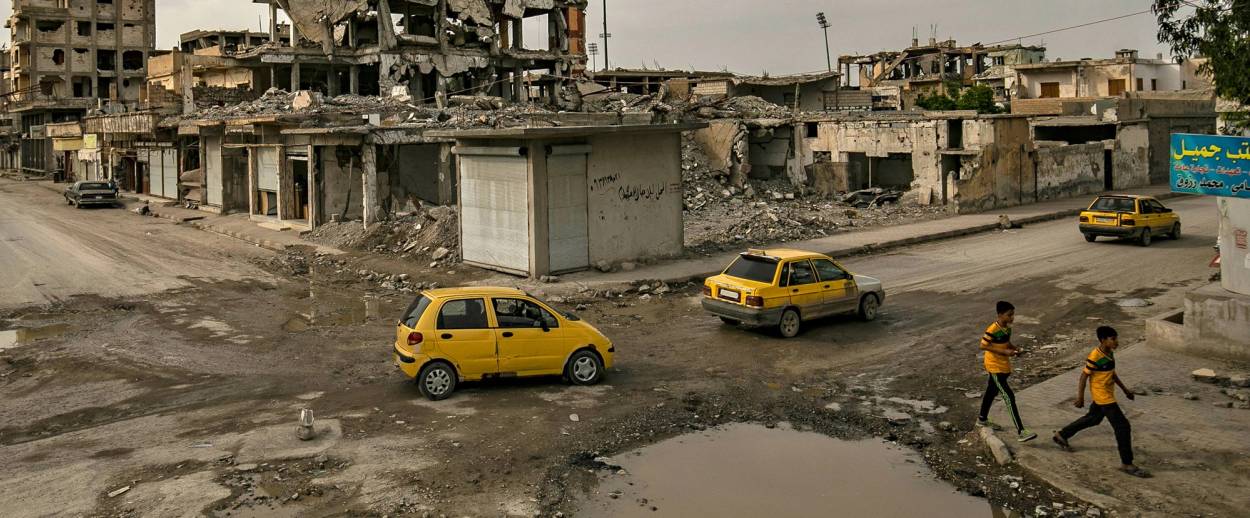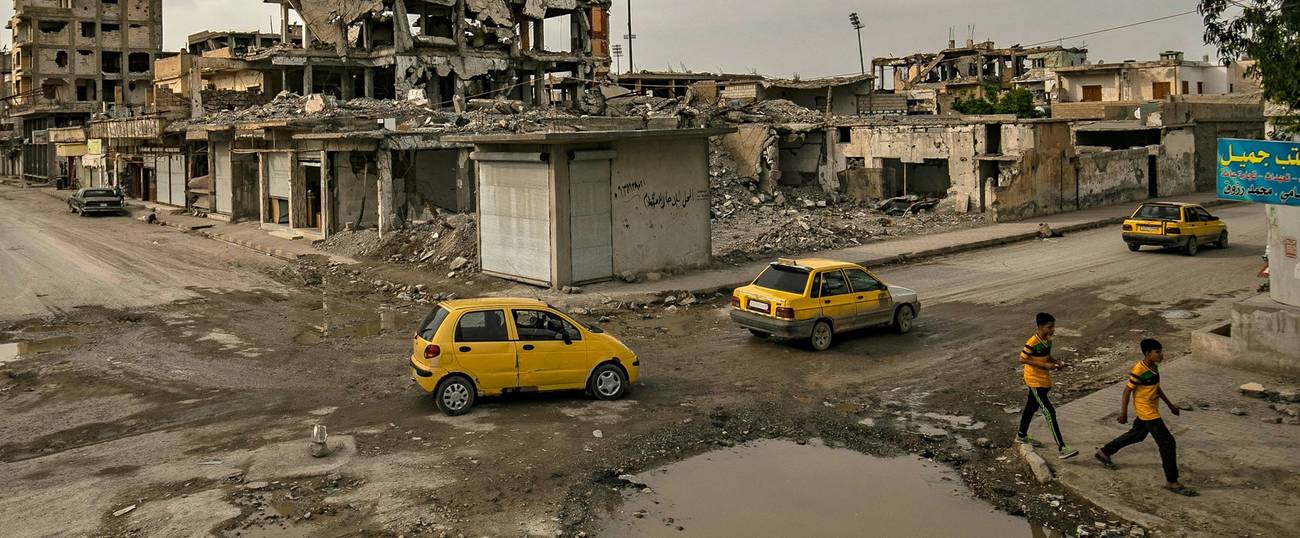Fighting the Wrong War on ISIS
Two years on, the time has come for a moral assessment of our military strategy in the Middle East




This piece was originally published in French in La Règle du Jeu on June 23, 2019.
The war against the Islamic State ended in 2017 with the defeat of the self-proclaimed caliphate. Now, two years on, the time has come for a moral assessment of that war, in which a terrorist state lacking an army was able to defy the international community for four years before victory was won. Let’s take a close look at the strange waiting game played by the West.
“No boots on the ground!” That was the watchword of Western governments and their militaries, including those in the United States, the United Kingdom, and France. It was repeated over and over to the Kurds as they stood up to ISIS in Iraq and Syria.
We Westerners wanted to be done with ISIS, which posed a twin threat to the Middle East and our own cities, but we did not intend to put our own boots on the ground. We were not going to repeat our experience in Iraq and Afghanistan. Aside from a limited number of Special Forces, the ground war against ISIS and its self-styled caliphate would fall to Kurdish and Iraqi proxies. We would train them, arm them, and supply them; we would provide air support and long-range artillery for the retaking of cities. But we were not going to send any soldiers in, for fear that one of them should fall into ISIS’ hands and be tortured on YouTube, sending public opinion into a tailspin. We would not give ISIS an opportunity to denounce a new impious and idolatrous crusade, to decry the presence of new crusaders in the hopes of rousing the Muslim masses.
After three years of difficult containment of ISIS by proxies standing alone on the front lines, years that the caliphate used to gain strength and prepare for the final battle, it fell to the Kurds, the peshmerga, Syria’s YPJ, and the Iraqis, operating under the Western doctrine of intervention from behind via proxies, to put their proxy boots on the ground and retake the Nineveh Plains, Mosul, Raqqa, and the territories that the caliphate had conquered elsewhere in Iraq and Syria.
In the meantime, the West’s political and strategic choice was criticized by a ranking French officer, Colonel Legrier, who, before his return to France, had been in charge of the long-range Caesar cannons supplied and operated by France. His end-of-mission report was published in France’s national defense review but then withdrawn after it ignited a firestorm. Legrier was subsequently reprimanded and blacklisted by the French military authorities.
Legrier blamed the West’s proxy war for dragging on for three long years without shrinking the caliphate in the slightest, for giving the terrorists free rein to torment civilian populations, and, in the belated final reckoning, causing immeasurable destruction through air and artillery attacks on ISIS-held cities. Those attacks were carried out for fear that the proxies would not be able to occupy and clear the cities street by street, as seasoned French commandos and legionnaires, along with their British and American counterparts, could have done. The result? Ninety percent of Mosul and Raqqa were destroyed before being retaken by the proxy forces. Not to mention the thousands of civilians who died during the shelling, killed not by ISIS but because they were caught between opposing fire. In Legrier’s mind, this political and human disaster was the fruit of an erroneous strategic choice.
According to Legrier, an early intervention by several thousand elite Western troops would have allowed the allies to quickly gain the upper hand against ISIS, a backward force lacking heavy arms, tanks, planes, and discipline, and that was dug into the cities it had captured. ISIS would have been quickly crushed. Fewer lives would have been lost, there would have been less destruction, and subject populations would have been liberated earlier. In a word, the Western Special Forces could indeed have done things better, faster, and at a lower human cost than the local forces.
Which raises several questions.
– What purpose might have been served by delaying a serious intervention for three years, while leaving ISIS time to prepare, to protect its rear, and to plan its clandestine future? One exculpatory hypothesis goes as follows: Instead of intervening right away, Western strategists chose to allow thousands of ISIS recruits from Europe, Asia, and elsewhere to flock to the caliphate, the better to eradicate them in one fell swoop. But it’s hard to put much stock in this theory. No such wait-and-see strategy surrounded the intervention against Gaddafi in Libya.
– What is the use of training and maintaining at exorbitant cost thousands of elite soldiers within the three largest Western armies—American, British, and French—if they are not to be used, and if less-skilled proxy fighters are to be used in their stead?
– Has the death in combat of Western troops—even professional soldiers—become so taboo as to justify falling back on proxies, veritable replacement armies to which we subcontract wars that we are no longer willing to fight?
With these questions in mind, here are some measures of the esteem in which the West holds the proxies:
1. Once Mosul was retaken and the war about to be won, the West condemned the Iraqi Kurds’ referendum on independence and allowed Iraqi-Iranian militias to wrest Kirkuk and other disputed territory from the peshmerga forces that just days before had been so highly praised for standing alone against ISIS for three years.
2. As soon as Raqqa was liberated by the YPJ, Trump announced the withdrawal from Syria of 2,000 members of the U.S. Special Forces, leaving Rojava at the mercy of the Turks and Bashar Assad.
3. The war won, France refused the repatriation of French nationals who had fought with ISIS for prosecution in France, and, while deploring the prospect that the death penalty, which France rejects, might be applied to them, had no scruples about handing the hot potato to the Kurds in Syria and to Iraqi “justice.”
Thanks proxies. See you soon; best of luck in the meantime!
The counterexample to the no-boots-on-the-ground military policy, under which ground combat is delegated to local forces, is France’s action in the Sahel. Over that vast expanse, the fight against Islamic terrorism has for four years been waged directly by 4,500 French soldiers and flyers, not by forces from Mali, Mauritania, or Chad, and not by the international African force that was assembled for the purpose but lacks everything needed for the fight. The aforementioned local forces, inexperienced and underequipped, serve only as reinforcements. Control of operations is in the hands of the French military, who alone have the arms, the logistics, and the know-how required for the task and who alone man the front line.
From the opposing camp comes another example of direct intervention that, for lack of our own direct intervention, has succeeded to our detriment. While the West refrained from lending any direct support to a Syrian rebellion that was deemed to be too splintered, refusing even to set up a no-fly zone as it had against Gaddafi, which would have prevented Syrian aircraft from pummeling Aleppo and liberated cities, the Russians, emboldened by the West’s abstention, did not hesitate to put their own boots on the ground. Two years down the road, the result was the effective defeat of the Syrian resistance and the return of most of Syria to Bashar Assad.
In a geopolitical context marked by doubt about the West’s commitment, where Trumpian isolationism had already broken Atlantic solidarity and U.N.-based multilateralism (thereby obliterating the barriers to the rise of authoritarian states and the enemies of democracy), the question of European self-defense was starkly posed in Iraq and Syria in late 2018 when the American leader, declaring the war won, announced the withdrawal of the 2,000 American Special Forces. Would Europe take advantage of this opportunity to assemble a European force of similar strength to take over as the Americans departed? Not a chance. No more American soldiers or leadership on the ground? None from Europe, either. Everybody packed their bags.
Donald Trump had just joined the likes of Daladier, Chamberlain, and other appeasers in the black book of betrayal of vulnerable people. The same man who lauded the valor of Kurdish fighters had decided, against the advice of America’s military and diplomatic officials (notably Defense Secretary James Mattis and special diplomatic envoy Brett McGurk, who resigned over the matter), to pull out the American soldiers who were safeguarding northern Syria against Erdogan’s Turkey and Bashar Assad. Following Obama’s failure to punish Damascus for gassing civilians in Ghouta—and after the abandonment of Iraqi Kurdistan by its Western allies (who were guilty of having voted for independence in September 2016)—this threat of American withdrawal and its nonreplacement with an equivalent European force looked a lot like a fresh retreat by the West.
In the light of America’s withdrawal and the fracturing of the Atlantic alliance, both fruits of Trumpian whim, the implications of the twin Western approaches—intervention from behind and engagement from above—go far beyond Iraqi and Syrian Kurdistan. The challenge is global. As the fracture widens, one wonders whether the United States and the rest of the West, so interventionist before overreacting to become as cautious as they are today, remain ready to use their own forces in tomorrow’s asymmetrical wars against new forms of the Islamic State that may emerge in Asia or Africa. Might the compass swing back in the other direction? What lessons for the future can be drawn from the war against ISIS and subsequent events?
Put yourself in the place of a people threatened a few years from now by religious terrorism or the sort of ethnic cleansing that occurred in Bosnia and Rwanda. What will those people make of the timorous, irresolute waiting game the West played in Syria and Iraq in the face of an unprecedented conflict, still far from resolved, with a totalitarian, theocratic proto-state? I believe that the West’s war against ISIS in Syria and Iraq says this: Never again will we be sucked into a new Afghanistan, involving a permanent presence on the ground. There will be no more direct interventions, however brief, that put our troops in the line of fire. And there will be no more nation-building, as in Libya a few years ago and in South Sudan and Mosul today. Henceforth, with the exception of France in the Sahel, the West will refrain and withdraw.
In the face of the widespread Western inclination toward moral, political, and military retreat from distant lands beset by barbarians, what hope remains for Americans and Europeans who have not given up on universal values and still believe in internationalism? What uses can and should be made of the power and the forces that we still possess? How vigilant must we be—and against what new dangers?
We owe it to ourselves, to the Kurds, to other like-minded friends and allies—and to the forgotten peoples of Darfur, Yemen, Somalia, and the Sahel—to answer these questions.
Translated from French by Steven Kennedy.
***
Like this article? Sign up for our Daily Digest to get Tablet magazine’s new content in your inbox each morning.
Gilles Hertzog, born in 1948, is a French writer and a human rights activist alongside Bernard-Henri Lévy for 40 years. His latest book, Le dernier Vénitien, was published in 2018.